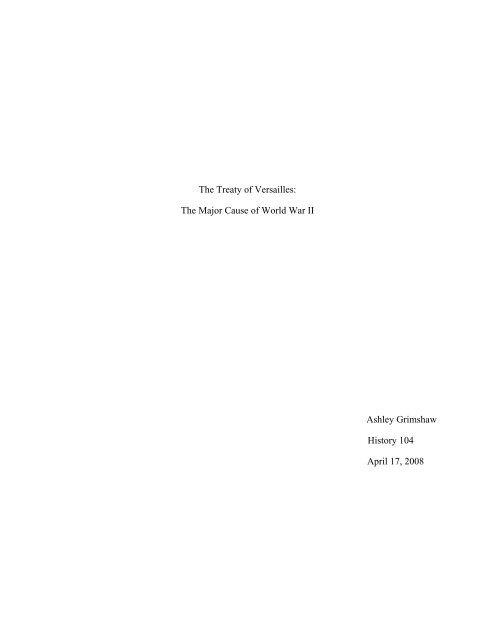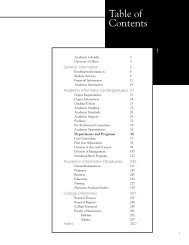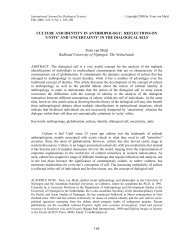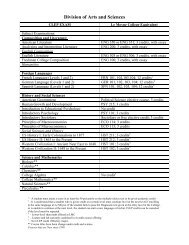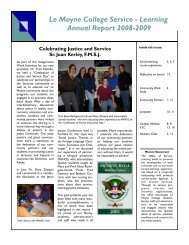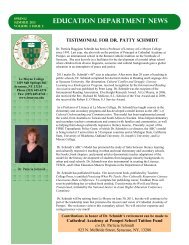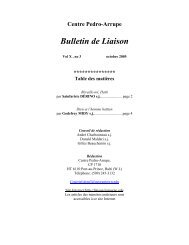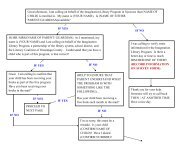The Treaty of Versailles - Le Moyne College
The Treaty of Versailles - Le Moyne College
The Treaty of Versailles - Le Moyne College
Create successful ePaper yourself
Turn your PDF publications into a flip-book with our unique Google optimized e-Paper software.
<strong>The</strong> <strong>Treaty</strong> <strong>of</strong> <strong>Versailles</strong>:<br />
<strong>The</strong> Major Cause <strong>of</strong> World War II<br />
Ashley Grimshaw<br />
History 104<br />
April 17, 2008
Outline<br />
<strong>The</strong>sis: <strong>The</strong> <strong>Treaty</strong> <strong>of</strong> <strong>Versailles</strong> was the major cause <strong>of</strong> World War II.<br />
I. Introduction: <strong>The</strong> <strong>Treaty</strong> <strong>of</strong> <strong>Versailles</strong> caused problems that led to World War II.<br />
II. <strong>The</strong> stipulations <strong>of</strong> the <strong>Treaty</strong> <strong>of</strong> <strong>Versailles</strong>.<br />
III. <strong>The</strong> peace created by the <strong>Treaty</strong> <strong>of</strong> <strong>Versailles</strong> wouldn’t last long. (quotes)<br />
IV. <strong>The</strong> German’s reaction to the treaty.<br />
V. <strong>The</strong> <strong>Treaty</strong> <strong>of</strong> <strong>Versailles</strong>’ affect on the German economy.<br />
VI. <strong>The</strong> economic hardships <strong>of</strong> the German people caused by the <strong>Treaty</strong> <strong>of</strong> <strong>Versailles</strong>.<br />
VII. <strong>The</strong> loss <strong>of</strong> territory as a result <strong>of</strong> the <strong>Treaty</strong> <strong>of</strong> <strong>Versailles</strong> and its contribution to World War<br />
II.<br />
VIII. <strong>The</strong> Weimar Republic and its relation to the <strong>Treaty</strong> <strong>of</strong> <strong>Versailles</strong> and the German people’s<br />
distrust <strong>of</strong> it.<br />
IX. <strong>The</strong> rise <strong>of</strong> Hitler and fascism because <strong>of</strong> the <strong>Treaty</strong> <strong>of</strong> <strong>Versailles</strong>.<br />
X. Hitler’s steps to reversing the <strong>Treaty</strong> <strong>of</strong> <strong>Versailles</strong> and the start <strong>of</strong> World War II.<br />
XI. Conclusion
<strong>The</strong> <strong>Treaty</strong> <strong>of</strong> <strong>Versailles</strong>:<br />
<strong>The</strong> Major Cause <strong>of</strong> World War II<br />
World War I was a major shock for the world. It left much <strong>of</strong> Europe devastated, in debt,<br />
and the victors looking for revenge. That was the victors’ downfall at the Paris Peace Conference<br />
in 1919. While the delegates <strong>of</strong> the Allies making the treaty should have been worried about the<br />
future <strong>of</strong> Europe, they allowed themselves to become preoccupied with worries about borders,<br />
power, and making Germany, as weak as possible. 1 <strong>The</strong> <strong>Treaty</strong> <strong>of</strong> <strong>Versailles</strong>, signed on June 28,<br />
1919, was supposed to create peace, but in the end all it created was another disaster. 2 <strong>The</strong> treaty<br />
forced Germany to lose territory, caused serious economic problems which were only worsened<br />
by the depression <strong>of</strong> the 1930s, left thousands <strong>of</strong> Germans outside <strong>of</strong> Germany, and all <strong>of</strong> these<br />
things created German resentment towards the Western world. <strong>The</strong> effects <strong>of</strong> the <strong>Treaty</strong> <strong>of</strong><br />
<strong>Versailles</strong> weakened Germany’s government and that, along with all <strong>of</strong> the effects, allowed for<br />
the rise <strong>of</strong> fascism and Hitler in Germany after World War I. All <strong>of</strong> these factors added up to the<br />
beginning <strong>of</strong> World War II and they were all caused by the <strong>Treaty</strong> <strong>of</strong> <strong>Versailles</strong>. <strong>The</strong> <strong>Treaty</strong> <strong>of</strong><br />
<strong>Versailles</strong> was the major cause <strong>of</strong> World War II.<br />
<strong>The</strong> stipulations <strong>of</strong> the <strong>Treaty</strong> <strong>of</strong> <strong>Versailles</strong> were specifically aimed at making Germany<br />
as weak as possible. Certain parts <strong>of</strong> the treaty took away German territory and distributed it to<br />
other countries or the territory was used to form new countries. Areas like the Saar Basin and<br />
Upper Silesia, which were important to the German economy, were given to France and Poland,<br />
respectively. 3 Poland also received Danzig. 4 Other territories that were ceded included Alsace-<br />
Lorraine to France, Eupen-Malmedy to Belgium, North Schleswig to Denmark, and West<br />
Prussia, which became know as the Polish Corridor, to Poland. 5 All <strong>of</strong> Germany’s overseas<br />
1
colonies were ceded to the Allies as well. 6 <strong>The</strong> <strong>Treaty</strong> <strong>of</strong> <strong>Versailles</strong> also created the smaller<br />
nation <strong>of</strong> Austria in place <strong>of</strong> what had been Austria-Hungary before the war and the new nation<br />
<strong>of</strong> Czechoslovakia from German land. 7 <strong>The</strong> <strong>Treaty</strong> <strong>of</strong> <strong>Versailles</strong> weakened Germany’s means <strong>of</strong><br />
transportation. It put Germany’s river system under foreign control. 8<br />
Along with Poland getting<br />
the area <strong>of</strong> Danzig, the <strong>Treaty</strong> <strong>of</strong> <strong>Versailles</strong> gave it control <strong>of</strong> the railroads and free use <strong>of</strong> the<br />
port there. 9 <strong>The</strong> <strong>Treaty</strong> <strong>of</strong> <strong>Versailles</strong> also ordered that all <strong>of</strong> the ships in Germany’s mercantile<br />
marine were to be given to the Allies and ordered that Germany must build ships for the Allies in<br />
the years to come. 10 In addition the treaty put restrictions on Germany’s military. Germany was<br />
allowed an army <strong>of</strong> one hundred thousand and a navy <strong>of</strong> fifteen thousand. 11 Under the treaty<br />
Germany wasn’t allowed an air force, armored cars, tanks, heavy guns, submarines, or<br />
dirigibles. 12 <strong>The</strong> treaty also forbade the import <strong>of</strong> war materials into Germany. 13 Furthermore the<br />
Rhineland was demilitarized. 14 Finally, the <strong>Treaty</strong> <strong>of</strong> <strong>Versailles</strong> laid Germany solely responsible<br />
for World War I and ordered that Germany pay the entire cost <strong>of</strong> it through an undefined amount<br />
<strong>of</strong> reparations in an article that read: “<strong>The</strong> Allied and Associated Governments however, require,<br />
and the German Government undertakes that to the extent <strong>of</strong> her utmost capacity, she will make<br />
compensation for all damage done to the civilian population <strong>of</strong> the Allied or Associated Powers<br />
and to their property by her aggression by land, by sea, and from the air.” 15 <strong>The</strong> treaty also<br />
stipulated that the reparations could be made through transferable wealth, like gold and ships,<br />
from the value <strong>of</strong> property in the ceded territories, and through annual payments <strong>of</strong> cash and<br />
materials. 16 While the <strong>Treaty</strong> <strong>of</strong> <strong>Versailles</strong> was successful in making Germany weak, its terms<br />
would later lead to World War II.<br />
2
Although the Allied delegates thought they had successfully ended the World War I and<br />
had prevented the German threat with the <strong>Treaty</strong> <strong>of</strong> <strong>Versailles</strong>, they were wrong. <strong>The</strong> treaty that<br />
they had created was a weak one. 17 Many political figures recognized this and predicted the<br />
horrible results to come. Marshal Ferdinand Foch, a French General who had been involved in<br />
World War I, said <strong>of</strong> the treaty, “This is not peace. It is an armistice for twenty years.” 18 A South<br />
African statesman named Jan Christian Smuts wrote to British Prime Minister David Lloyd<br />
George: “This treaty breathes a poisonous spirit <strong>of</strong> revenge, which may yet scorch the fair face –<br />
not <strong>of</strong> a corner <strong>of</strong> France, but <strong>of</strong> Europe.” 19 Alfred Lord Milner, the British Colonial Secretary<br />
called the <strong>Treaty</strong> <strong>of</strong> <strong>Versailles</strong> “the peace to end peace.” 20 All <strong>of</strong> these men correctly described<br />
the <strong>Treaty</strong> <strong>of</strong> <strong>Versailles</strong>, but they would not know that until 1939. 21<br />
While everyone had a reaction to the <strong>Treaty</strong> <strong>of</strong> <strong>Versailles</strong>, no reaction could be compared<br />
to that <strong>of</strong> the German people. Upon the printing <strong>of</strong> the treaty’s terms in German newspapers the<br />
Germans were outraged. 22 <strong>The</strong>y viewed the treaty as vicious and unjust. 23 <strong>The</strong>se feelings<br />
stemmed not only from the conditions <strong>of</strong> the <strong>Treaty</strong> <strong>of</strong> <strong>Versailles</strong>, but from the fact that the<br />
German people had believed that the treaty would be along the lines <strong>of</strong> President Wilson’s<br />
Fourteen Points, which called for much fairer treatment <strong>of</strong> Germany. 24 <strong>The</strong> treaty that they read,<br />
the <strong>Treaty</strong> <strong>of</strong> <strong>Versailles</strong>, was vastly different from Wilson’s Fourteen Points. 25 German outrage<br />
was also geared toward their government because they were appalled by the government’s<br />
acceptance <strong>of</strong> such a treaty. 26 This feeling <strong>of</strong> outrage would later turn to a feeling <strong>of</strong> resentment<br />
<strong>of</strong> the Europeans that made the treaty and <strong>of</strong> the government that accepted it. <strong>The</strong> German<br />
peoples’ resentment would not go away as they blamed all their economic difficulties on the<br />
3
<strong>Treaty</strong> <strong>of</strong> <strong>Versailles</strong> and viewed themselves as a country surrounded by vengeful enemies. 27 <strong>The</strong><br />
<strong>Treaty</strong> <strong>of</strong> <strong>Versailles</strong> caused German resentment that Hitler capitalized on to gain support and that<br />
led to the beginning to World War II.<br />
<strong>The</strong> <strong>Treaty</strong> <strong>of</strong> <strong>Versailles</strong> had a crippling effect on the German economy. Before World<br />
War I the German economy had been dependent on three things: overseas commerce and trade,<br />
iron and coal, and its transport and tariff system. 28 <strong>The</strong> treaty’s provisions harmed each <strong>of</strong> these<br />
in some way. <strong>The</strong> loss <strong>of</strong> Germany’s overseas colonies, mercantile marine, and transport systems<br />
to other nations, previously mentioned, obviously affected the economy. Before the war<br />
Germany was a very important part <strong>of</strong> the European trading system. Germany was the largest<br />
source <strong>of</strong> supply to Russia and Italy and the second largest source <strong>of</strong> supply to Britain and<br />
France. 29 <strong>The</strong> <strong>Treaty</strong> <strong>of</strong> <strong>Versailles</strong> hindered this by taking away Germany’s means <strong>of</strong><br />
transporting goods to these nations. Without sufficient means <strong>of</strong> transportation Germany couldn’t<br />
export as many goods, harming her economy. Also without transportation Germany had to pay<br />
for her trade to be carried to and from other nations. <strong>The</strong> problem with this was that Germany did<br />
not have any spare money due to the reparations imposed by the <strong>Treaty</strong> <strong>of</strong> <strong>Versailles</strong>. 30 <strong>The</strong><br />
<strong>Treaty</strong> <strong>of</strong> <strong>Versailles</strong> also contained terms that did not allow Germany to charge custom duties on<br />
imports, denying Germany another large source <strong>of</strong> income. 31 So once again its economy was<br />
injured.<br />
As mentioned before the German economy was also dependent upon iron and coal, but<br />
the <strong>Treaty</strong> <strong>of</strong> <strong>Versailles</strong> managed to harm this part <strong>of</strong> its economy as well. <strong>The</strong> loss <strong>of</strong> Alsace-<br />
Lorraine to France meant the loss <strong>of</strong> ore-fields for Germany, a major loss given that these ore-<br />
4
fields had contained seventy-five percent <strong>of</strong> Germany’s iron-ore. 32 <strong>The</strong> Saar Basin and Upper<br />
Silesia, which were ceded to France and Poland respectively in the <strong>Treaty</strong> <strong>of</strong> <strong>Versailles</strong>,<br />
contained the majority <strong>of</strong> Germany’s coal fields. 33 <strong>The</strong> loss <strong>of</strong> territory was not the only reason<br />
Germany lost its coal resources as a result <strong>of</strong> the <strong>Treaty</strong> <strong>of</strong> <strong>Versailles</strong>; the Germans were also<br />
required by the treaty to deliver millions <strong>of</strong> tons <strong>of</strong> coal to France, Belgium, and Italy as part <strong>of</strong><br />
their reparation payments. 34 <strong>The</strong> economy <strong>of</strong> Germany was dependent on coal for its energy<br />
needs. 35 Coal was needed to keep locomotives running to transport trade goods, it was needed for<br />
the electricity in factories, and it was needed to keep factories running in general. 36 Due to its<br />
loss <strong>of</strong> territory and its reparations from the <strong>Treaty</strong> <strong>of</strong> <strong>Versailles</strong> Germany had an inability to<br />
transport the goods and keep open the factories that held up its economy.<br />
<strong>The</strong> loss <strong>of</strong> coal was not the only way the territory provisions in the <strong>Treaty</strong> <strong>of</strong> <strong>Versailles</strong><br />
hurt the German economy. <strong>The</strong> loss <strong>of</strong> territory also meant a loss <strong>of</strong> the German industry in these<br />
areas, because the industries also fell under control <strong>of</strong> the countries that received the area,<br />
creating the loss <strong>of</strong> a portion <strong>of</strong> the German economy. 37 Finally the reparations from the <strong>Treaty</strong><br />
<strong>of</strong> <strong>Versailles</strong> injured the German economy. <strong>The</strong> reparation total was astronomical, at about forty<br />
billion dollars. So for many years after World War I any income for the German economy<br />
beyond what was absolutely necessary was stripped from it, making recovery virtually<br />
impossible. 38 <strong>The</strong> <strong>Treaty</strong> <strong>of</strong> <strong>Versailles</strong> was extremely hard on the German economy. It made<br />
Germany weak, just as it intended to, but this weakness created by the treaty would only fuel the<br />
German desire to become strong once again, yet another reason for the beginning <strong>of</strong> World War<br />
II. And no matter how badly the <strong>Treaty</strong> <strong>of</strong> <strong>Versailles</strong> affected the economy, its affect on the<br />
German people due to its affect on the economy was much worse.<br />
5
<strong>The</strong> economic problems in Germany caused by the <strong>Treaty</strong> <strong>of</strong> <strong>Versailles</strong> were hard on the<br />
German people and got even worse during the depression <strong>of</strong> the 1930s. <strong>The</strong> treaty caused<br />
unemployment, poverty, and famine. 39 <strong>The</strong> <strong>Treaty</strong> <strong>of</strong> <strong>Versailles</strong> not only took away territory<br />
away from Germany, it took property away from Germans. In those areas that were ceded to<br />
other countries the German owned properties had no security, meaning that German industries<br />
and land could be taken from their owners without any compensation. 40 This angered the<br />
German people and it also made them more susceptible in Germany’s injured economy. <strong>The</strong><br />
reparations part <strong>of</strong> the <strong>Treaty</strong> <strong>of</strong> <strong>Versailles</strong> caused the collapse <strong>of</strong> currency and inflation in<br />
Germany and with these two events the German people’s savings were wiped out. 41 Before<br />
World War I Germany had become an industrialized nation, and because <strong>of</strong> that it had become<br />
dependent on the importation <strong>of</strong> raw materials and food. 42 Because <strong>of</strong> the <strong>Treaty</strong> <strong>of</strong> <strong>Versailles</strong><br />
Germany was unable to import enough food due to its lack <strong>of</strong> transportation and money to do so<br />
and this led to famine. 43<br />
<strong>The</strong> <strong>Treaty</strong> <strong>of</strong> <strong>Versailles</strong> also led to a vast increase in unemployment in Germany. <strong>The</strong><br />
loss <strong>of</strong> its coal resources and Germany’s inability to import an adequate amount <strong>of</strong> raw materials<br />
meant that many industries could not survive and that put many German people out <strong>of</strong> work. 44<br />
<strong>The</strong> loss <strong>of</strong> the German merchant marine and the decline in trade due to the <strong>Treaty</strong> <strong>of</strong> <strong>Versailles</strong><br />
also contributed to the rise in unemployment. Without the merchant marine and sufficient trade<br />
there were no longer jobs for those German people who relied on navigation and trade as a<br />
source <strong>of</strong> income. 45 During the Depression ten percent <strong>of</strong> the German population was<br />
unemployed. 46 <strong>The</strong> <strong>Treaty</strong> <strong>of</strong> <strong>Versailles</strong> not only affected the unemployment rate in Germany it<br />
affected the benefits that the German people received. Before World War I unemployed Germans<br />
6
eceived generous unemployment insurance, but because <strong>of</strong> the reparations element <strong>of</strong> the <strong>Treaty</strong><br />
<strong>of</strong> <strong>Versailles</strong> and the affect that it was having on Germany during the Depression the German<br />
government could no longer afford to be so generous. Unemployment insurance for people in<br />
Germany during the Depression was reduced ten to twelve percent and the number <strong>of</strong> people<br />
who were able to receive these benefits also decreased. 47 Even those who did have jobs were<br />
harmed as the salaries <strong>of</strong> public workers in Germany were cut four to eight percent. 48 <strong>The</strong>se<br />
economic sufferings hit the German people hard and in their minds their economic problems<br />
became directly connected with the provisions that had been forced upon them by foreign nations<br />
in the <strong>Treaty</strong> <strong>of</strong> <strong>Versailles</strong>. 49 <strong>The</strong> German people resented the <strong>Treaty</strong> <strong>of</strong> <strong>Versailles</strong> and the people<br />
who created it because <strong>of</strong> the life it had imposed upon them. It would not be long before the<br />
German people were tired <strong>of</strong> their weakness and suffering and began to strive towards world<br />
power once again.<br />
Furthermore, the loss <strong>of</strong> land caused by the <strong>Treaty</strong> <strong>of</strong> <strong>Versailles</strong> was a monumental issue<br />
in German minds. Not only did the loss <strong>of</strong> territory mean a loss <strong>of</strong> resources and industry for<br />
Germany it meant that the German people were no longer one, which was a good thing to the<br />
Allies, but an outrage to the German people themselves. With the loss <strong>of</strong> lands to other nations<br />
and the creation <strong>of</strong> new nations millions <strong>of</strong> Germans were left outside <strong>of</strong> Germany as a result <strong>of</strong><br />
the <strong>Treaty</strong> <strong>of</strong> <strong>Versailles</strong>. In Alsace-Lorraine, which was ceded to France, the majority <strong>of</strong> the<br />
population was German speaking. 50 In the Saar Basin, which was also under French control, less<br />
than one hundred people <strong>of</strong> the six hundred fifty thousand living there were French, the rest were<br />
German. 51 <strong>The</strong> German lands that were given to Austria and Czechoslovakia in the <strong>Treaty</strong> <strong>of</strong><br />
<strong>Versailles</strong> left seven million and three million Germans in these nations respectively. 52 In the<br />
7
years after the <strong>Treaty</strong> <strong>of</strong> <strong>Versailles</strong> was signed Germany never truly accepted its loss <strong>of</strong><br />
territory. 53 Eventually this unhealed wound would motivate the German desire to completely<br />
reunite its land and people, another cause <strong>of</strong> World War II. 54 This desire was displayed perfectly<br />
in Hitler’s Mein Kampf when he wrote: “<strong>The</strong> reunion <strong>of</strong> these two German states [Germany and<br />
Austria] is our life task, to be carried out by every means at our disposal. Common blood belongs<br />
to a common Reich.” This was a warning as to what was to come as a result <strong>of</strong> the <strong>Treaty</strong> <strong>of</strong><br />
<strong>Versailles</strong>.<br />
<strong>The</strong> <strong>Treaty</strong> <strong>of</strong> <strong>Versailles</strong> also caused problems in Germany in respect to the democratic<br />
government, the Weimar Republic. <strong>The</strong> German people accepted the Weimar Republic after<br />
World War I because they thought it would encourage the delegates making the <strong>Treaty</strong> <strong>of</strong><br />
<strong>Versailles</strong> to be more lenient on them, but when their plan failed the Weimar Republic became<br />
very unpopular. 55 When the German people saw the conditions <strong>of</strong> the <strong>Treaty</strong> <strong>of</strong> <strong>Versailles</strong> they<br />
were outraged at the government for accepting such a document. 56 Many Germans, especially<br />
German nationalists, went as far as referring to the acceptance <strong>of</strong> the treaty as treasonous. 57 As<br />
the effects <strong>of</strong> the <strong>Treaty</strong> <strong>of</strong> <strong>Versailles</strong> began to show in Germany, for instance the inflation, the<br />
unemployment, and the cut in wages, the German people became even more hostile toward the<br />
government that had allowed it to happen. 58 Over time Germans did not regard the Weimar<br />
Republic as a legitimate government. 59 Many times the Weimar Republic, created in<br />
consideration <strong>of</strong> the negotiations after World War I, created its own problems. For example, the<br />
Weimar Republic was exceedingly lenient to its opponents in Germany and furthermore it gave<br />
former Imperial <strong>of</strong>ficials positions in its civil service and courts and these people openly<br />
pr<strong>of</strong>essed anti-republican feelings. 60 <strong>The</strong>se actions undermined the government that the German<br />
8
people were already hostile to because <strong>of</strong> the affect that the <strong>Treaty</strong> <strong>of</strong> <strong>Versailles</strong> was having on<br />
their country. Before long the German people were looking for a leader who shared their feelings<br />
about the <strong>Treaty</strong> <strong>of</strong> <strong>Versailles</strong> and their desire to make Germany strong once again, and they<br />
would find that leader in Adolf Hitler.<br />
Hitler and the <strong>Treaty</strong> <strong>of</strong> <strong>Versailles</strong>, along with the beginning <strong>of</strong> World War II, are all<br />
directly connected. <strong>The</strong> <strong>Treaty</strong> <strong>of</strong> <strong>Versailles</strong> led to the rise <strong>of</strong> fascism and Hitler in Germany and<br />
to the beginning <strong>of</strong> World War II. Hitler established the Nazi Party in 1919 and in the following<br />
years his number <strong>of</strong> supporters grew steadily. 61 Hitler capitalized on the German resentment <strong>of</strong><br />
the <strong>Treaty</strong> <strong>of</strong> <strong>Versailles</strong>. He was an ardent nationalist as were many Germans, as a result <strong>of</strong> how<br />
weak the <strong>Treaty</strong> <strong>of</strong> <strong>Versailles</strong> had made their nation. 62 <strong>The</strong> national anthem <strong>of</strong> the Reich,<br />
“Deutschland, Deutschland uber Alles” (“Germany, Germany above all else.”) drew in the<br />
German people who felt that their nation needed help out <strong>of</strong> the low that the <strong>Treaty</strong> <strong>of</strong> <strong>Versailles</strong><br />
had put it in. 63 <strong>The</strong> German people were calling out for the end <strong>of</strong> effects <strong>of</strong> the <strong>Treaty</strong> <strong>of</strong><br />
<strong>Versailles</strong> and the end to the Weimar Republic, and these were the main themes in Nazi<br />
propaganda. 64 Hitler was a very charismatic person who was able to gain massive support by<br />
denouncing the <strong>Treaty</strong> <strong>of</strong> <strong>Versailles</strong> and the Weimar Republic that the German people hated so<br />
much. 65 <strong>The</strong> inflation created by the reparation terms <strong>of</strong> the <strong>Treaty</strong> <strong>of</strong> <strong>Versailles</strong> destroyed the<br />
German middle class, and what had been the most stable part <strong>of</strong> German politics quickly became<br />
hostile and easily recruited by Hitler. 66 <strong>The</strong> German people also joined Hitler’s ranks because<br />
they could not find jobs and because <strong>of</strong> the promises <strong>of</strong> the Nazi party. 67 <strong>The</strong> German people<br />
liked Hitler’s Four Year Plan that called for slum clearance, housing programs, land reclamation,<br />
and construction <strong>of</strong> roads many problems that had been created by the <strong>Treaty</strong> <strong>of</strong> <strong>Versailles</strong>. 68<br />
9
Hitler was the culmination <strong>of</strong> what the German people wanted when he told a storm trooper “I’ll<br />
get rid <strong>of</strong> <strong>Versailles</strong>…” 69 <strong>The</strong> German people believed that he would and on January 30, 1933,<br />
Hitler became Chancellor <strong>of</strong> Germany. 70 Finally, the last step created by the <strong>Treaty</strong> <strong>of</strong> <strong>Versailles</strong><br />
on the road to World War II was complete.<br />
<strong>The</strong> steps that Hitler took that actually started World War II were all attempts to reverse<br />
what the <strong>Treaty</strong> <strong>of</strong> <strong>Versailles</strong> had created. <strong>The</strong> <strong>Treaty</strong> <strong>of</strong> <strong>Versailles</strong> had created economic<br />
problems by demanding reparations, diminishing Germany’s necessary trade, taking away<br />
resources and industry, and causing inflation and unemployment. <strong>The</strong> <strong>Treaty</strong> <strong>of</strong> <strong>Versailles</strong><br />
separated the German people by taking German territory, and an unpopular government was put<br />
into place because <strong>of</strong> the <strong>Treaty</strong> <strong>of</strong> <strong>Versailles</strong>. Hitler was working to fix all <strong>of</strong> these problems<br />
when he took the actions that began World War II. He wanted to rid Germany <strong>of</strong> its democratic<br />
government, he wanted to make Germany powerful economically, militarily, and geographically<br />
again, and he wanted to unite the German people. He took the actions to do all <strong>of</strong> these things.<br />
He got rid <strong>of</strong> the unpopular Weimar Republic when he became Chancellor in 1933. In March<br />
1935 Hitler took steps to begin to restore the military power that the <strong>Treaty</strong> <strong>of</strong> <strong>Versailles</strong> had<br />
taken away when he announced the restoration <strong>of</strong> enlistment and the expansion <strong>of</strong> the German<br />
army. 71 He continued these efforts in June 1935 when he created the Naval Pact with Britain<br />
which allowed German naval strength to be expanded until it was thirty-five percent <strong>of</strong> the<br />
British naval establishment. 72 In March 1936 Hitler continued to expand Germany’s military<br />
reach and reverse the provisions <strong>of</strong> the <strong>Treaty</strong> <strong>of</strong> <strong>Versailles</strong> when he ordered that the Rhineland<br />
be re-militarized. 73 Hitler then worked to regain the German territory, resources, industries that<br />
had been lost due to the <strong>Treaty</strong> <strong>of</strong> <strong>Versailles</strong> and reunite the German people, a problem that was<br />
10
also created by the treaty. He accomplished part <strong>of</strong> this goal by annexing Austria in the<br />
“Anschluss” in March 1938. 74 Hitler’s success continued when Germany was given the<br />
Sudetenland <strong>of</strong> Czechoslovakia in the Munich Agreement in September 1938. 75 <strong>The</strong> final straw<br />
came on September 1, 1939 when Hitler made one more attempt to truly end the restrictions put<br />
on Germany by the <strong>Treaty</strong> <strong>of</strong> <strong>Versailles</strong> when he invaded Poland to get back the Polish Corridor,<br />
World War II began two days later. 76<br />
<strong>The</strong> <strong>Treaty</strong> <strong>of</strong> <strong>Versailles</strong> created major problems in Germany that led to German<br />
resentment and their desire to erase what the treaty had done to their country. <strong>The</strong> restrictions<br />
that the <strong>Treaty</strong> <strong>of</strong> <strong>Versailles</strong> put on Germany led to economic destruction, an unsatisfactory<br />
government, a radical population, and a separated people. <strong>The</strong> German people could have<br />
nothing but hate for the treaty and its effects that destroyed their country. <strong>The</strong> resentment and<br />
desire to restore Germany as it once was created by the <strong>Treaty</strong> <strong>of</strong> <strong>Versailles</strong> led to the rise <strong>of</strong><br />
Hitler and fascism in Germany. Hitler’s actions, supported by the German people, to erase the<br />
restrictions put on Germany by the <strong>Treaty</strong> <strong>of</strong> <strong>Versailles</strong> led to the beginning <strong>of</strong> World War II. If<br />
the Allies’ delegates creating the <strong>Treaty</strong> <strong>of</strong> <strong>Versailles</strong> had been more concerned with the future<br />
<strong>of</strong> Europe rather than the punishment <strong>of</strong> Germany, World War II may have never happened. But<br />
with the harshness <strong>of</strong> the restrictions <strong>of</strong> the <strong>Treaty</strong> <strong>of</strong> <strong>Versailles</strong>, World War II was inevitable<br />
because it was natural for German people to desire the return <strong>of</strong> their nation to power and unity.<br />
<strong>The</strong> <strong>Treaty</strong> <strong>of</strong> <strong>Versailles</strong> was the major cause <strong>of</strong> World War II.<br />
11
Endnotes<br />
1 John Maynard Keynes, <strong>The</strong> Economic Consequences <strong>of</strong> Peace (New York: Penguin Books,<br />
1995) 56.<br />
2 Arno J. Mayor, Politics and Diplomacy <strong>of</strong> Peacemaking (New York: Alfred A. Knopf, Inc.,<br />
1967) 753.<br />
3 Keynes 82-84.<br />
4 Paul Mantoux, <strong>The</strong> Deliberations <strong>of</strong> the Council <strong>of</strong> Four (March 24 – June 28, 1919) trans. and<br />
eds. Arthur S. Link and Manfred F. Boemeke (Princeton: Princeton University Press, 1992) 271.<br />
5 Richard Grunberger, Germany 1918-1945 (New York: Harper & Row, Publishers, Inc., 1964)<br />
55.<br />
6 Keynes 67.<br />
7 Grunberger 117.<br />
8 Keynes 52.<br />
9 Mantoux 271.<br />
10 Keynes 66.<br />
11 Margaret Macmillan, Paris 1919: Six Months That Changed the World (New York: Random<br />
House, Inc., 2001) 176.<br />
12 Macmillan 176.<br />
13 Macmillan 176.<br />
14 Grunberger 55.<br />
15 Mantoux 178.<br />
16 Keynes169.<br />
17 Matthew Hughes and Matthew S. Seligmann, Does Peace <strong>Le</strong>ad to War: Peace Settlements<br />
and Conflict in the Modern Age (Phoenix Mill: Sutton Publishing, 2002) 44.<br />
18 Hughes and Seligmann 24.<br />
19 Hughes and Seligmann 24.
20 Hughes and Seligmann 24.<br />
21 Grunberger 148.<br />
22 Grunberger 53.<br />
23 Richard M. Watt, <strong>The</strong> Kings Depart (New York: Simon and Schuster, 1968) 504.<br />
24 Keynes 57.<br />
25 Keynes 64.<br />
26 Grunberger 56.<br />
27 Watt 504.<br />
28 Keynes 65-66.<br />
29 Keynes 17.<br />
30 Keynes 67.<br />
31 Keynes 102-103.<br />
32 Keynes 87.<br />
33 Keynes 82-84.<br />
34 Keynes 87.<br />
35 Richard Bessel, Germany After the First World War (Oxford: Oxford University Press, 1993)<br />
111.<br />
36 Bessel 111.<br />
37 Keynes 68.<br />
38 Keynes 101 and 242.<br />
39 Mayer 766.<br />
40 Keynes 69.<br />
41 Keynes 73.<br />
42 Keynes 230.<br />
43 Keynes 229.
44 Keynes 229.<br />
45 Keynes 229.<br />
46 Grunberger 82.<br />
47 E.J. Feuchtwanger, From Weimar to Hitler (London: <strong>The</strong> Macmillan Press, 1993) 246.<br />
48 Feuchtwanger 247.<br />
49 Feuchtwanger 318.<br />
5050 Keynes 70.<br />
51 Keynes 83.<br />
52 Grunberger 116-117.<br />
53 Grunberger 75.<br />
54 Mayer 774.<br />
55 Grunberger 94.<br />
56 Grunberger 56.<br />
57 Grunberger 59.<br />
58 Grunberger 97.<br />
59 Feuchtwanger 316.<br />
60 Grunberger 96.<br />
61 Grunberger 61.<br />
62 Grunberger 69.<br />
63 Grunberger 64.<br />
64 Grunberger 99.<br />
65 Richard J. Evans, <strong>The</strong> Coming <strong>of</strong> the Third Reich (New York: <strong>The</strong> Penguin Press, 2004) 447.<br />
66 Paul Birdsall, <strong>Versailles</strong> Twenty Years After (Hamden: Archon Books, 1962) 301-302.<br />
67 Grunberger 109.
68 Grunberger 106.<br />
69 Grunberger 90.<br />
70 Grunberger 93.<br />
71 Watt 501.<br />
72 Grunberger 122.<br />
73 Grunberger 124.<br />
74 Watt 501.<br />
75 Grunberger 139.<br />
76 Grunberger 148.
Bibliography<br />
Bessel, Richard. Germany After <strong>The</strong> First World War. Oxford: Oxford University Press, 1993.<br />
Birdsall, Paul. <strong>Versailles</strong> Twenty Years After. Hamden: Archon Books, 1962.<br />
Evans, Richard J. <strong>The</strong> Coming <strong>of</strong> the Third Reich. New York: <strong>The</strong> Penguin Press, 2004.<br />
Feuchtwanger, E.J. From Weimar to Hitler. London: <strong>The</strong> Macmillan Press, 1993.<br />
Grunberger, Richard. Germany 1918-1945. New York: Harper & Row Publishers, Inc., 1946.<br />
Hughes, Matthew, and Matthew S. Seligmann. Does Peace <strong>Le</strong>ad to War: Peace Settlements<br />
and Conflict in the Modern Age. Phoenix Mill: Sutton Publishing, 2002.<br />
Keynes, John Maynard. <strong>The</strong> Economic Consequences <strong>of</strong> the Peace. New York: Penguin Books,<br />
1995.<br />
Macmillan, Margaret. Paris 1919: Six Months That Changed the World. New York: Random<br />
House, Inc., 2001.<br />
Mantoux, Paul. <strong>The</strong> Deliberations <strong>of</strong> the Council <strong>of</strong> Four (March 24 – June 28, 1919). Trans.<br />
and eds. Arthur S. Link and Manfred F. Boemeke. Princeton: Princeton University Press,<br />
1992.<br />
Mayor, Arno J. Politics and Diplomacy <strong>of</strong> Peacemaking. New York: Alfred A. Knopf, Inc.,<br />
1967.<br />
Watt, Richard M. <strong>The</strong> Kings Depart. New York: Simon and Schuster, 1968.


